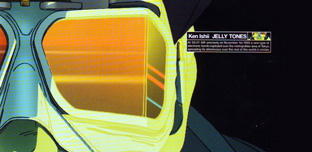After a string of seminal releases in the late '80s and early '90s, R&S Records slowly slid into obscurity. But now, the imprint is back and better than ever, with releases celebrating its past and looking firmly into the future. RA's David Stubbs investigates...
"James Brown," Henry Rollins once spat contemptuously, "could never have come from Belgium!" And yet, this unassuming lowlands country, victim of the truism that you'd be hard pressed to find ten famous people who came from the place, has played a key role in the development and delivery of dance music, especially as the '80s turned into the '90s. Groups like Underground Resistance acknowledged as much when they cut their "Belgian Resistance" single, while in 1991, Joey Beltram remarked in an interview, "The Belgians were the first people who could relate to me. Belgium was very, very advanced."
So much so that Renaat Vandepapeliere founded the Belgian R&S dance label back in 1984, the name deriving from the initials of his own name and that of his partner, Sabine Maes. Vandepapeliere had worked as a DJ, playing soul, jazz fusion and funk as well as electronic, but had become frustrated with the way that American imports were treated when they reached Belgium. "Working in a music shop and seeing what happened when imports came in, there was a very bad habit in Belgium, when an import became very big in the clubs, someone would go to the studio and make an imitation of it, a copy, which was cheaper but also rubbish. I always had a difficulty with that. So that's why we started—so that we could license the original stuff."
Initially going under the name Milos Music Belgium, the couple released a single vinyl 12-inch by forgotten Belgian duo Big Tony. As the '80s wore on, however, Belgium was attracting international attention for homegrown movements such as New Beat (big, electro-brutalist floorstompers fronted by the likes of The Lords Of Acid and Jade 4U), as well as the more visually arresting likes of Front 242, whose sample-heavy "electronic body music" flirted dangerously with terrorist chic and geopolitics on tracks like "Funk Ghadaffi."

A bluffer's guide to R&S
Aphex Twin - Analogue Bubblebath
Along with "Didgeridoo," here was where Richard James, AKA Aphex Twin, announced himself to the world, taking the post-acid scene to a darker, more fertile place with this sombrely anthemic classic.
Second Phase - Mentasm
The temporary AKA of Joey Beltram, Second Phase and "Mentasm" was a pivotal '90s release, a perverse, pitch-black variant on acid with a rogue strain of Black Sabbath-style heaviness whizzing round its circuitry.
Human Resource - Dominator
"I wanna kiss myself!" snarls the rapper with meta-narcissistic robo-insistency on this sternly hedonistic Eurodisco milestone, the mutant "Mentasmic" riff erasing like windscreen wipers on full power throughout.
Jam & Spoon - Stella
First released in 1992, "Stella" opened up a skylight for those who found the R&S oeuvre stifling at times. It's a mellow-cholic masterpiece, all galloping keyboards and a respirating synth pulse which anticipates everything from LTJ Bukem to the lush, minimal techno of Kompakt.
Radio Slave - Eyes Wide Open/Incognito
R&S come right up to speed with this storming release from the much-respected Matt Edwards, AKA Radio Slave, two minimal, bass and percussion-led dancefloor-to-air odysseys which easily evoke R&S's best traditions: Pleasure and discipline.
Despite the fact that Renaat himself was never personally that interested in the likes of Front 242, the group helped establish Belgium as an unlikely fulcrum of new electronic music. In 1981, Marvin Gaye had taken a lengthy sabbatical in Ostend, prior to recording his album Midnight Love. By the late '80s, it seemed less far-fetched for Derrick May to be flown over by Renaat from Detroit to Belgium instead. But this was prior to the era of DJ culture, the rise of which personally dismayed the label owner.
"For artists like Derrick, their dream back then was making records. When the DJ became the star, to me that's when things went all wrong. When they were earning thousands of pounds, playing just the music that the public wanted in short sets—I thought it was better when they made records which came from the heart."
While Vandepapeliere certainly harboured some utopian ideas about dance music, in those initial, post-rave years, the music was becoming darker, and heavier, with a sense of heaving claustrophobia characterising clubs like Boccaccio. By 1991, this was reflected in the In Order to Dance series inaugurated by R&S, which collected together the various singles they issued. These included early works by Moby, Model 500, but also Joey Beltram, whose "Energy Flash" and "Mentasm" (released under the name Second Phase) helped define a grimly hedonistic shift in dance, in which the music became hurts-so-good, hard work full of punishing dirges typified by murky bass and neon throbbing.
"The year after we released 'Mentasm,' two years after, every record that came out sounded like 'Mentasm,'" recalls Vandepapeliere. "It was a compliment, in a way, for Joey, for the label, but it was also annoying. That was the mentality of commercial labels, though—copying, not creating."
He also introduced the world to The Aphex Twin, whose "Didgeridoo," based around a single note on the traditional antipodean instrument showed that it was possible to dispense with a tune altogether and have a huge hit. "He came up with something original there, for sure," says Vandepapeliere. "I always say, no one ever came close to Richard (James), no one. Many tried, no one came close. He is unique."
With cuts by CJ Bolland, Human Resource and Golden Girls' "Kinetic," gloriously remixed by Orbital, DJ Hell and Jaydee, R&S appeared to set the tone of the 1991 dance scene, the music matching the intensity and high temperatures physically experienced on the European dancefloors at the time. "The main club was Omen in Frankfurt, which I went to every week, then spread to Holland. Talk about claustrophobia. Christ! It was very intense and very real in a way I don't see today." Elsewhere, dance music was being reduced to a very very macho, 'ardkore. And yet, despite having been regarded as a champion of that sort of music, Vandepapeliere never really cared for it. "If you listen back to the records we made back then, it wasn't just noise for the sake of noise. Those were always funky records," he protests.
"I never was into the idea that 'electronic music = no emotion.' Personally, I need some soul, or funk, or a little melody mixed in. Some emotion. Otherwise it does nothing for me. My philosophy has been, always put out records that women would dance to. Make records for women. If the women dance, so will the men."





